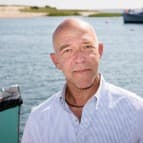Advertisement
commentary
During The AIDS Epidemic, Cape Cod Was A Refuge. Now, For Some, It Is Again

A quiet influx, like a subtle rising tide, has filled Cape Cod summer homes and neighborhoods that are usually empty in early spring.
Professors have retreated to their studies in the woods, trying to figure out whether the funky Internet connection can handle a virtual lecture on Zoom. Lawyers from Boston and New York have gathered whole families together at comfortable summer homes, offices shut, courts out of action. An equity fund manager can manage from the handsome Cape abode just as well as from a suite downtown, especially since there isn’t much to manage right now.
Many seasonal people already considered the Cape a place of respite, solace, vacation, retreat — an escape — and so the journey makes sense, it’s a natural. But now there is added impetus to isolate, avoid community, hide in place.
All this brings to mind another virus, another epidemic 30-odd years ago when the Cape, in particular Provincetown, attracted many people coming to face that scourge: HIV and AIDS.
Then, people who knew they were infected and believed they faced a death sentence decided to “escape,” not to avoid community, but to find it. People moved to the Cape thinking they were living their last chapter. Why not seek out a place where they wouldn’t feel as isolated, where they could find support and compassion, where they didn’t need to hide? And so Provincetown filled with men whose vacation memories were joyful, who sought comfort and year-round refuge by being “out” while sick.
People moved to the Cape thinking they were living their last chapter.
Frankie Giamatteo was one of those. He came from East Boston, a handsome wildman who tested positive for the HIV virus early on. I met him when I moved to Provincetown to work on a WGBH documentary about a year in the life of the town. Frankie dove into the community with a passion, becoming a political activist, handing out condoms at midnight in front of bars he used to frequent, meditating on deserted beaches because he believed he could fight this virus without resorting to the “corporate poison” of anti-retroviral drugs like AZT. He hunkered down. He sheltered in place. But he didn’t hide. And soon not a week passed without him joining the gathering of yet another funeral.
Of course, the differences are profound between then and now, that virus and this one, who is being infected and why. AIDS was an epidemic related to lifestyle, sexuality and drug use. It was not entirely arbitrary, nor universal. Many people openly or secretly believed that those who contracted it were culpable, far from victims, perhaps even unholy manifestations of some other will.
This time there is none of that, and hopefully, there never will be. We are not blaming victims, even as we must ostracize them.
But then, as now, the question of government response hovers over the crisis.
But now, as then, fear of infection creates resentment. In the early days of AIDS, there were people who felt these new arrivals shouldn’t come, that they created a danger and burden. In recent days, similar feelings have emerged. Residents have called to "close the bridges" many times in Cape Cod history, but it's never been a realistic option. Given Cape Cod’s economic reliance on the people who come, it also sounds hypocritical. But never, until this year, has it sounded so much like “build a wall.” Of course, no one is coming to Cape Cod to vacation, but even Gov. Charlie Baker has mused aloud about whether it would be better for people to shelter in their primary residences rather than their second homes. Strange to think of second-home owners as immigrants: upscale, but still not welcome by some.
The question of government response connects this moment to AIDS as well. Both times at first there was denial, though this time that was swept away much more quickly. Both times there needed to be a steep learning curve to understand the virus, and how best to combat it. But given who is at risk — everyone, especially, older people — this time we are moving much faster and more forcefully. Society has more confidence in our response and less suspicion of ulterior motives than the gay community felt.
It took far too long, too many deaths, before AIDS became what (in the first world at least) people now call a “manageable” disease. Activists believed the government and pharmaceuticals didn’t move fast enough, but successful treatment did emerge. That didn’t happen in time for Frankie Giamatteo, who died just months before it became clear that the “AIDS cocktail” he despised actually worked. His distrust of authority and government was a big part of who he was and why he was so wonderfully feisty, but in the end, it betrayed him.
We don’t know how badly this virus will hurt us, whether our response will work, whether we will look back and say our government did the right and necessary things or not. We won’t know for a while whether this new influx to the Cape, to escape a virus, accomplishes that goal.
But we remember that time and hope more than anything that the funerals that came so hard on each other, week after week, will not come again.
